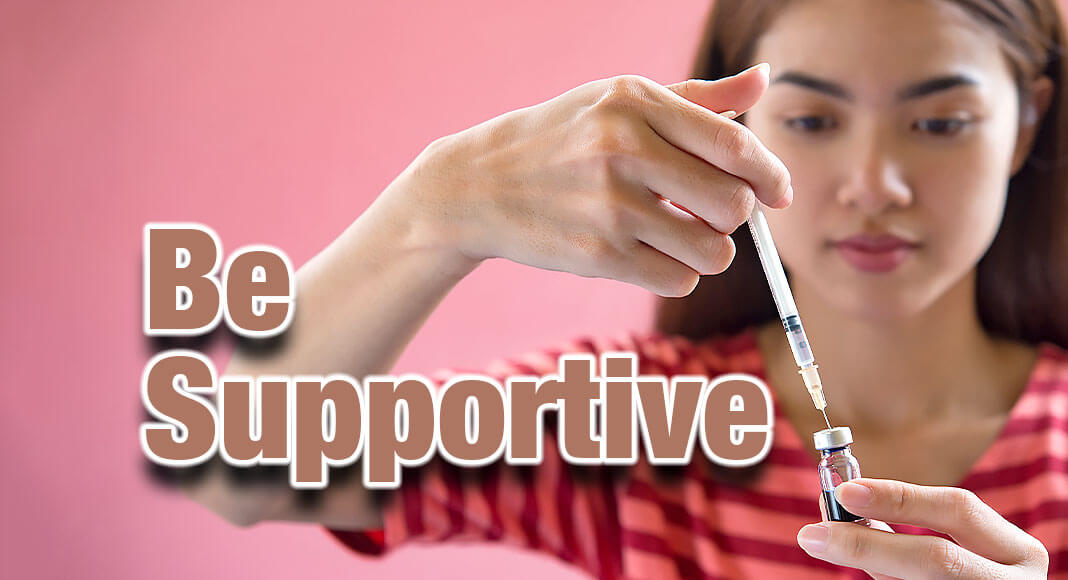
Mega Doctor News
CDC – Chances are you know someone with diabetes. They could be a friend, coworker, neighbor, a family member, or even you. And unfortunately, chances are the person you know with diabetes has experienced stigma, or negative attitudes, about having diabetes. Much of the stigma comes from people not knowing enough about diabetes. Reducing diabetes stigma starts with education and raising awareness. Keep reading to learn more.
Diabetes is a serious health condition that millions of Americans live with today. Some people think that people with diabetes make poor decisions or have bad habits, and that’s why they have diabetes. The truth is that diabetes is caused by either the body not being able to make insulin (type 1 diabetes) or because the body doesn’t use insulin well (type 2 diabetes).
Experiencing diabetes stigma is a challenge that many people with diabetes face. In fact, did you know that more than half of people with diabetes report that they have experienced diabetes stigma? Diabetes stigma can exist anywhere: in the family, school, workplace, and even in health care settings. You may not realize it, but stigma can prevent people from getting the care they need, make diabetes management more difficult, and affect one’s mental health. Learning about diabetes stigma can help you recognize it and reduce it.
What is Diabetes Stigma?
Diabetes stigma is defined as negative attitudes, judgment, discrimination, or prejudice against someone because of their diabetes. It comes from the false idea that people with diabetes made unhealthy food and lifestyle choices, which resulted in their diagnosis. Diabetes stigma can particularly affect people who have diabetes and are overweight. These false beliefs do not consider key factors that can cause diabetes, such as genetics (traits you inherit from your parents) and social determinants of health.
This type of stigma can be experienced internally and externally. Internal stigma is a belief that a person with diabetes has about themselves. It can include feelings of self-blame, shame, and guilt. External stigma is blame and judgment that comes from other people and society. It can include awkward or mean looks, rejection, exclusion, and difficulty maintaining relationships and friendships.
Learning about diabetes is a great first step to help reduce stigma. If you know someone with diabetes, start a conversation with them.
How Does Stigma Affect People With Diabetes?
Experiencing stigma and discrimination can affect diabetes self-care and self-esteem, and ultimately lead to serious health complications for people with diabetes. The negative emotions that people with diabetes feel from being stigmatized can cause depression, anxiety, and embarrassment. In fact, it can negatively affect how someone manages diabetes. Stigma can discourage people with diabetes from performing important day-to-day diabetes care, such as injecting insulin, checking blood sugar levels, wearing diabetes devices, or even seeking treatment altogether.
And unlike many health conditions, diabetes is managed mostly by the person with diabetes. To better understand this, imagine riding a bike. The bicycle—like diabetes management—will successfully get from point A to point B by the person (someone with diabetes) pedaling it. Now, imagine that person going up a steep hill. The steep hill here is the experience of diabetes stigma. The person pedaling—or the person with diabetes—must work much harder to get to their destination. Being able to remove the stigma barrier for people with diabetes can make their journey to successfully manage their diabetes that much easier.
How people think and talk about diabetes can be key to improving health outcomes among people with diabetes and to reducing the negative attitudes and judgment surrounding the condition.
What Do People With Diabetes Want You to Know?
Diabetes is more complicated and far-reaching than you may know. Here are a few things that people with diabetes may want you to know:
- Blaming or shaming someone with diabetes isn’t helpful. Instead, show empathy, and be a source of encouragement and support. A little support and understanding can go a long way.
- Language matters. Avoid calling someone with diabetes a “diabetic.” Calling someone a diabetic implies that they are nothing more than their disease. Instead, say “person with diabetes.” It’s also important not to call someone without diabetes “normal.” This can make someone with diabetes feel abnormal or different and can be stigmatizing.
- Managing diabetes is a full-time job. There’s no clocking out with diabetes. Day-to-day care for people living with diabetes means monitoring blood sugar levels, blood pressure, cholesterol levels, and meal plans, as well as keeping up with doctor’s visits.
- Diabetes can be expensive. People with diabetes spend twice as much money on health care costs as someone without diabetes. With doctor visits, diabetes supplies, and medicine, diabetes care can quickly add up and cause financial strain.
- Support is critical. Letting someone with diabetes know that you’re there to support them if they need you can make a difference.
- At the end of the day, “I’m still me.” Diabetes doesn’t define a person. The person they are now is no different from the person they were before their diabetes diagnosis.
Information Source: CDC











